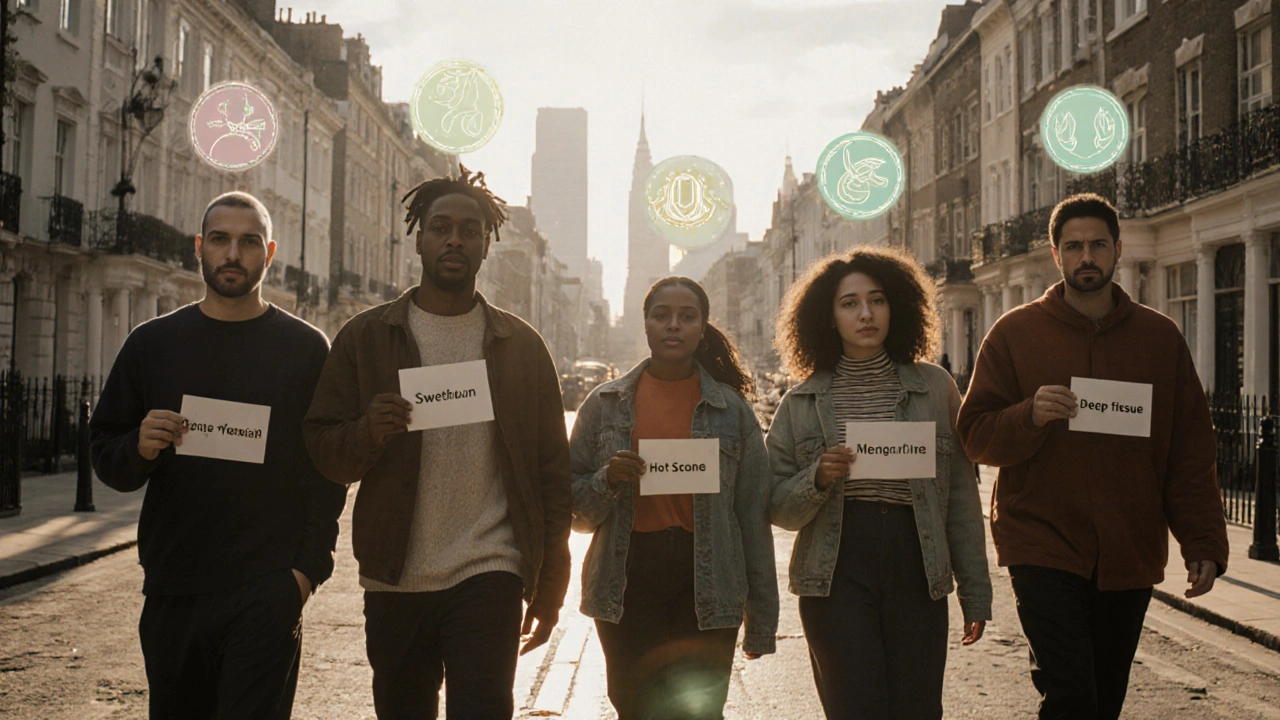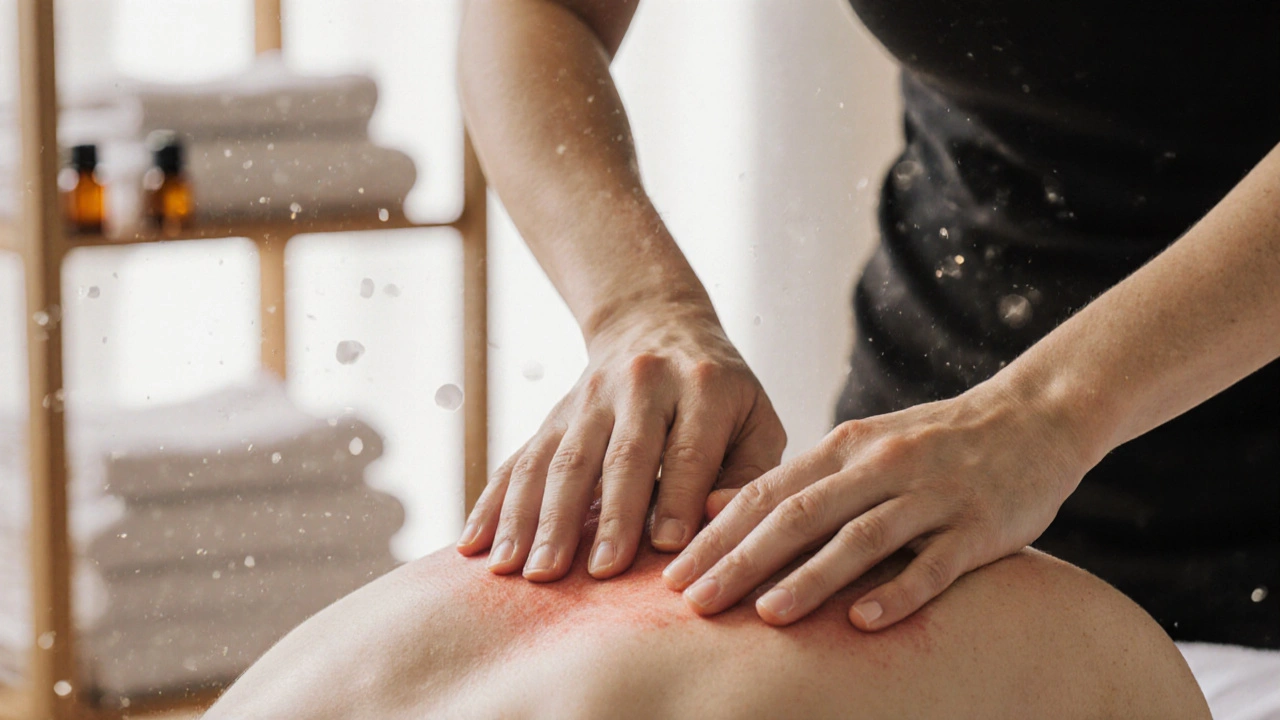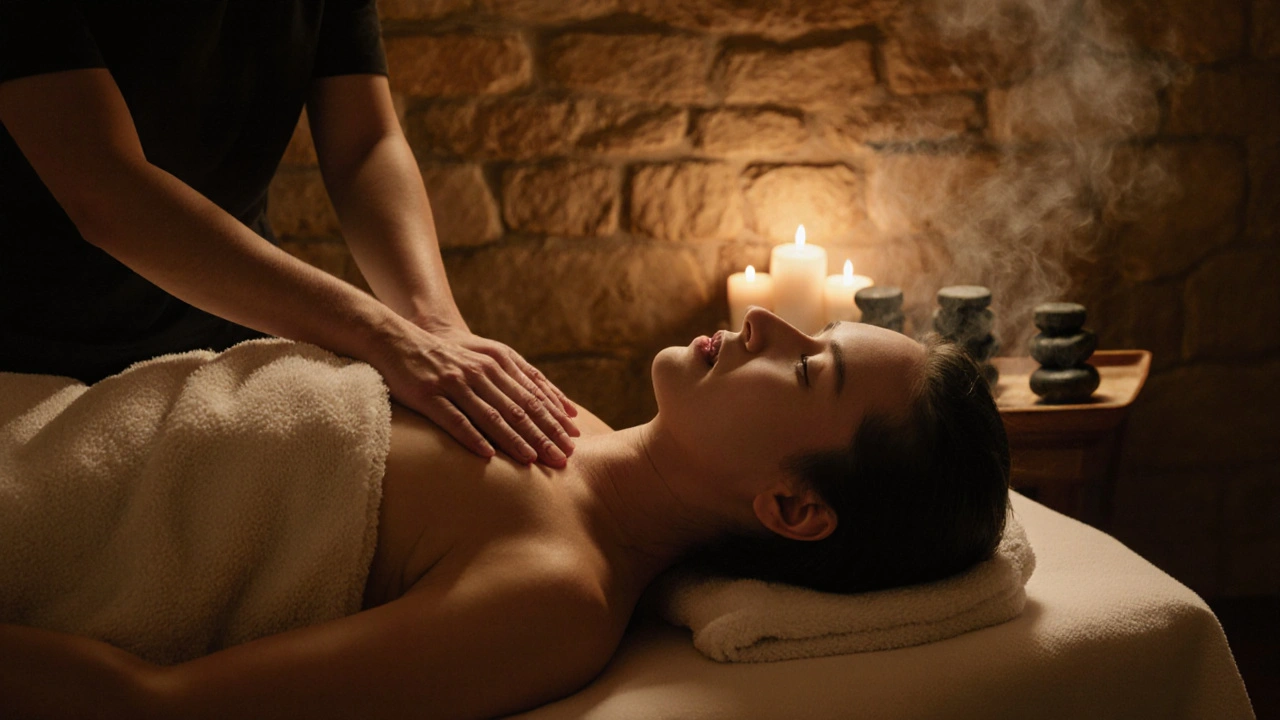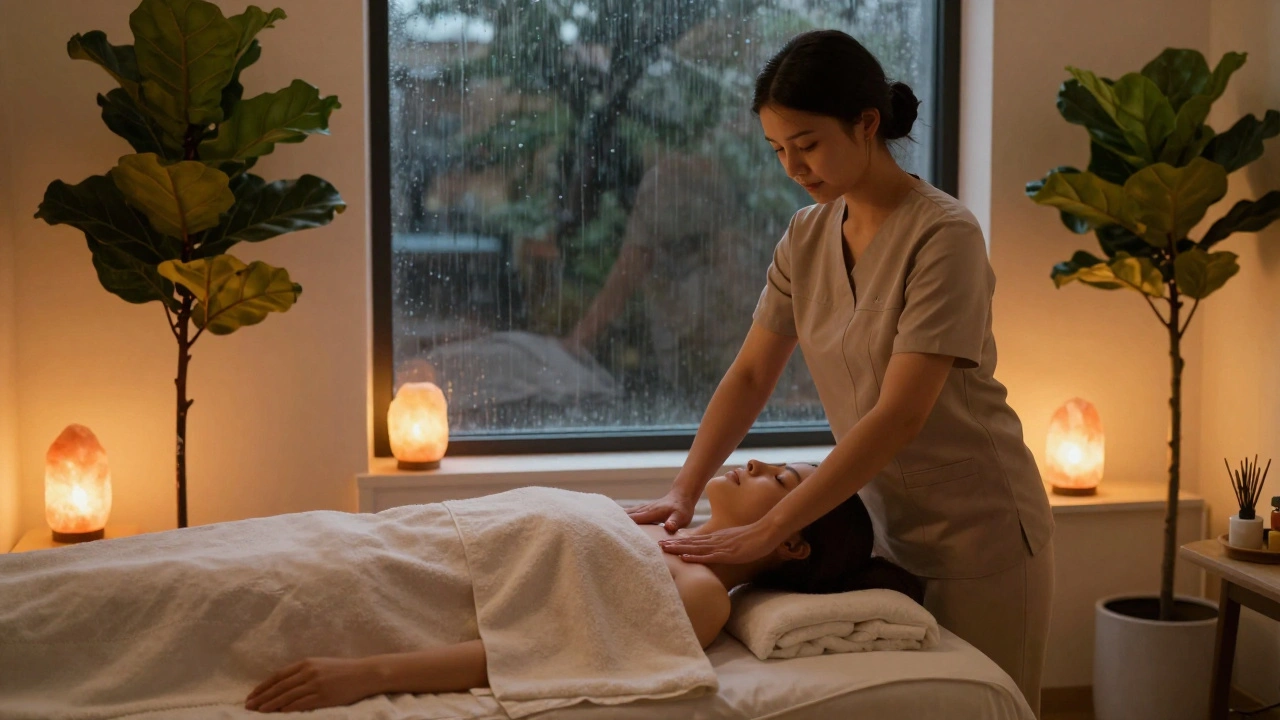You’ve had one of those days. The kind where your shoulders are glued to your ears, your neck feels like it’s been carved out of concrete, and the only thing standing between you and a meltdown is a warm hand on your back. You open your phone, type massage near me, and suddenly you’re staring at a hundred options-some with glowing reviews, others with photos that look like they were taken in a basement. Sound familiar?
Here’s the truth: not all massages are created equal. And finding the right one isn’t about picking the cheapest or the closest. It’s about finding the one that actually melts the tension out of your body and leaves you feeling like you’ve hit the reset button. In London, where stress levels are high and time is short, knowing where to go makes all the difference.
What You Really Need From a Massage
Let’s cut through the noise. When you search for massage near me, you’re not just looking for a service-you’re looking for relief. Relief from chronic stiffness. Relief from mental fog. Relief from the feeling that your body has been running on empty for weeks.
Most people think a massage is just about pressure. But the best ones? They’re about rhythm. About touch that knows where your tension hides-not just in your neck, but in your jaw, your hips, even your palms. A skilled therapist doesn’t just rub your back. They listen to your body. They notice the way you breathe when they press too hard. They adjust without you having to say a word.
Think of it like this: if your body were a smartphone, a good massage is the hard reset. No apps crashing. No background processes eating your battery. Just calm. Just quiet.
Types of Massage That Actually Work in London
Not every massage style is made for everyone. Here’s what’s actually effective-and where you’ll find it in London.
- Swedish Massage: The classic. Long, flowing strokes, light to medium pressure. Perfect if you’re new to massage or just need to unwind after a long week. You’ll find this in most spas across Notting Hill, Camden, and Shoreditch.
- Deep Tissue Massage: For the people who’ve been sitting at desks for 12 years straight. This targets deeper muscle layers. It’s not gentle, but if you’ve got knots that feel like pebbles under your skin, this is your fix. Look for clinics in Soho or Brixton that specialize in sports recovery.
- Hot Stone Massage: Warm basalt stones placed along your spine and shoulders. The heat sinks into your muscles like a slow exhale. Great for winter months-and surprisingly common in luxury studios in Chelsea and Mayfair.
- Thai Massage: No oil, no table. You stay dressed. The therapist uses their hands, knees, and feet to stretch and compress your body. It feels like yoga with a human guide. Popular in East London and around King’s Cross.
- Myofascial Release: Less known, but incredibly effective. Targets the connective tissue (fascia) that wraps around your muscles. If you’ve tried everything else and still feel tight, this could be your missing piece. Found in specialist clinics in West London.
Most places in London offer at least two of these. The key? Don’t just pick the one with the prettiest Instagram feed. Ask what technique they use for chronic tension. If they hesitate, walk away.
How to Find the Right Place Near You
Google Maps is your friend-but don’t trust it blindly. Here’s how to filter the noise:
- Check reviews with details: Look for comments like “My shoulder pain vanished after two sessions” or “They asked about my work posture.” Vague praise like “Great service!” means nothing. Specifics mean they care.
- Look for licensed therapists: In the UK, certified therapists are registered with the Complementary and Natural Healthcare Council (CNHC). Many reputable places display this on their website or in-store.
- Visit during off-hours: Go in on a Tuesday afternoon. See how clean it is. Is the receptionist friendly? Do they ask about your goals? A good place treats you like a person, not a booking number.
- Ask for a 15-minute consultation: Most quality places offer a free 10-15 minute chat before your first session. Use it. Tell them what’s bothering you. If they don’t ask follow-up questions, they’re not listening.
Try Therapy & Touch in Islington-they’ve been around since 2017 and specialize in chronic pain. Or The Relaxation Room in Hampstead, where therapists train in both Swedish and myofascial techniques. Both have 4.9-star ratings with 300+ reviews. Not because they’re fancy. Because they deliver.

What Happens During Your First Session
You walk in. You’re nervous. You don’t know what to wear. You’re wondering if you’ll be awkward.
Here’s what actually happens:
- You’ll fill out a quick form-nothing invasive. Just questions about injuries, pregnancy, or recent surgeries.
- The therapist will ask you: “Where do you carry your stress?” Not “Where does it hurt?” Big difference. They’re mapping your tension, not just treating symptoms.
- You’ll be given a private room with soft lighting and gentle music. They’ll leave while you get undressed (only what you’re comfortable with). You’re covered with towels the whole time.
- They’ll use a blend of techniques based on your needs. If you’re tense in your shoulders, they’ll start there. If your lower back feels like it’s holding up the world, they’ll go there first.
- They’ll check in. “Is this pressure okay?” Not once. Twice. Maybe three times.
- You’ll leave feeling lighter-not just physically, but mentally. Like you’ve been holding your breath for months and just exhaled.
Some people cry. Not because it hurts. Because they finally let go.
How Much Should You Pay?
Prices in London vary wildly. Here’s the real breakdown:
| Type | Duration | Average Price | Best For |
|---|---|---|---|
| Swedish | 60 minutes | £65-£85 | Stress relief, beginners |
| Deep Tissue | 60 minutes | £75-£95 | Chronic pain, athletes |
| Hot Stone | 75 minutes | £90-£110 | Winter relaxation, deep tension |
| Thai Massage | 90 minutes | £80-£100 | Flexibility, full-body reset |
| Myofascial Release | 60 minutes | £85-£115 | Long-term stiffness, posture issues |
Yes, some places charge £150 for a 60-minute session. But you don’t need to. You need a therapist who knows what they’re doing-not a chandelier or lavender-scented candles. Save the luxury for a special treat. For regular relief, stick to the £70-£95 range. That’s where the real skill lives.
Safety First: What to Watch Out For
London’s massage scene is mostly trustworthy. But there are red flags.
- No registration info: If they won’t tell you if their therapist is CNHC-certified, walk out.
- Pressure that hurts: Pain isn’t progress. If it feels like torture, speak up. A good therapist will adjust instantly.
- Too many add-ons: “Want to add aromatherapy? Scalp massage? Reflexology?” If they’re pushing extras before you’ve even started, they’re selling, not healing.
- Unprofessional environment: Dirty towels, bad lighting, no privacy. These aren’t minor issues. They’re signs of neglect.
And please-don’t book with someone who messages you on WhatsApp or Instagram DMs. Legit businesses have websites, phone numbers, and clear policies. If it feels sketchy, it is.

Massage vs. Physiotherapy: Which Do You Need?
People confuse these all the time. Here’s the simple version:
| Aspect | Massage | Physiotherapy |
|---|---|---|
| Goal | Relaxation, tension release, stress reduction | Recovery, injury rehab, mobility restoration |
| Who does it | Massage therapist (CNHC-certified) | Chartered physiotherapist (HCPC-registered) |
| Technique | Hands-on pressure, stretching, heat | Exercises, joint mobilization, ultrasound, posture correction |
| Insurance | Usually not covered | Often covered by private health plans |
| Best for | Stress, fatigue, tight muscles | Back pain from injury, post-surgery, sciatica |
If you’ve had a car accident or surgery? Go to physio. If you’re just tired of feeling like a robot? Go for a massage. They’re not competitors-they’re partners in feeling better.
Frequently Asked Questions
How often should I get a massage in London?
If you’re dealing with chronic stress or desk-related tension, once every 2-4 weeks is ideal. For maintenance, once a month keeps your muscles loose and your mind calm. Athletes or people with physically demanding jobs may need it weekly. Listen to your body-if you feel stiff again before your next session, don’t wait.
Can I get a massage if I’m pregnant?
Yes-but only with a therapist trained in prenatal massage. Avoid deep pressure on the abdomen and lower back. Many studios in London, like Pregnancy Wellness Centre in Richmond, offer specialized sessions. Always check with your doctor first, especially in the first trimester.
Should I tip my massage therapist?
Tipping isn’t expected in the UK, but it’s always appreciated. If your therapist went above and beyond-maybe they noticed your shoulder was tight before you even mentioned it-a £5-£10 tip is a kind gesture. But never feel pressured to give one.
What should I wear during a massage?
You’ll be covered with towels at all times. Most people wear underwear. Some prefer to be fully undressed. It’s entirely up to you. The therapist will leave the room while you get ready. If you’re uncomfortable, say so. Good therapists will adapt.
Is it normal to feel sore after a massage?
A little soreness-like after a good workout-is normal, especially after deep tissue. But sharp pain or bruising isn’t. Drink water afterward to flush out released toxins. If you’re still sore after 48 hours, it might have been too intense. Talk to your therapist next time.
Can I book a massage on the same day?
Yes, but don’t count on it. Popular spots fill up fast, especially evenings and weekends. If you need it urgently, call early in the morning. Some places offer walk-in slots, but they’re rare. Booking ahead-even 24 hours-is your best bet.
Ready to Feel Like Yourself Again?
You don’t have to live with this heaviness. Not anymore. The best massage near you isn’t a luxury. It’s a necessity. A way to reclaim your body from the grind, the screen, the noise.
Start small. Book one session. See how you feel the next day. If your shoulders drop, your breathing deepens, and you sleep like you used to-you’ll know. And you’ll book again.
London is full of quiet places where healing happens without fanfare. You just have to find one. And now, you know how.





Sharon Chui
November 20, 2025 AT 08:03I don't trust any of these places. I swear, half the 'licensed' therapists in London are fronting for some underground cult that uses essential oils to implant subliminal messages. I read a blog once-back when I still had sleep-that said the heat from hot stones can sync your chakras to satellite frequencies. That’s not relaxation. That’s surveillance. And don’t get me started on Thai massage. Ever notice how the therapist always seems to know exactly where your trauma lives? Coincidence? I think not.
They’re all listening. And they’re selling you peace so you’ll stop asking questions.
I still get my relief from a tennis ball and a wall. Free. Untraceable. No CNHC form required.
Marie-Eve Beaupré
November 20, 2025 AT 21:02Let’s be real-this whole post reads like an affiliate marketing funnel disguised as self-care. Every ‘expert’ recommendation is either a paid partnership or a cousin of the owner. The 4.9-star ratings? Bot-generated. The ‘specific reviews’? Copied from the same template with minor name swaps. And why are all the recommended spots clustered in areas with the highest rent? Coincidence? Or is the massage industry just another gentrification tool wrapped in lavender?
Meanwhile, my cousin in Manchester gets a 90-minute deep tissue for £40 from a retired nurse who uses coconut oil and a Spotify playlist called ‘Anxiety Eater.’ No certifications. No chandeliers. Just results.
Kristin Briggs
November 22, 2025 AT 04:53Okay but have you ever considered that the real issue isn’t the massage-it’s the fascia? Like, modern life has turned us all into human origami folded wrong. My therapist in Austin uses myofascial release like it’s a yoga flow for your connective tissue. She literally maps out my tension like it’s a topographical map of a war zone.
And the pricing? Honestly, £85 for 60 mins is a steal. In the US, you’d pay double for less personalized attention. And don’t even get me started on how most spas in London are just glorified saunas with a side of passive aggression from the receptionist who says ‘relax’ like it’s a threat.
Also-yes, crying is normal. I cried because the therapist noticed I was holding my breath. Not because she was good. Because I’d forgotten how to breathe. That’s the real win here. Not the oil. Not the stones. The awareness.
Sean Phoenix
November 23, 2025 AT 21:54Let’s not pretend this isn’t a corporate wellness scam. Massage is just the gateway drug to the $1200/month ‘holistic life optimization’ subscription. You get a massage, then they upsell you ‘craniosacral alignment,’ then ‘frequency-infused salt scrubs,’ then you’re signing a contract to have your aura scanned every Tuesday.
And why is every therapist suddenly a trauma-informed wizard? Because trauma is the new buzzword. The same people who told you to ‘just breathe’ during the pandemic are now charging £115 to ‘release emotional blockages in your sacrum.’
Meanwhile, your spine is just stiff because you’ve been hunched over a Zoom call for 14 years. No mysticism needed. Just a standing desk and a therapist who doesn’t whisper ‘you’re safe now’ while pressing into your glutes.
Erika Hernández
November 24, 2025 AT 20:25Just got my first massage last week-Deep Tissue at a little place in Peckham. Didn’t know what to expect. Walked in feeling like a robot with a jammed hinge. Left feeling like I’d been hugged by the universe.
They asked me where I carried my stress. I said ‘my jaw.’ They didn’t just massage it-they held it. Like they were listening. I didn’t cry. But I did sigh. Like, the kind of sigh that comes from a place you forgot existed.
You don’t need fancy certifications or Instagram lighting. You just need someone who sees you, not your symptoms. And yeah, £80 is worth it. Not because it’s a spa. But because it’s the only place I’ve found where I’m allowed to be heavy without being told to lighten up.
Do it. Just once. Your body remembers how to breathe. You just have to let it.